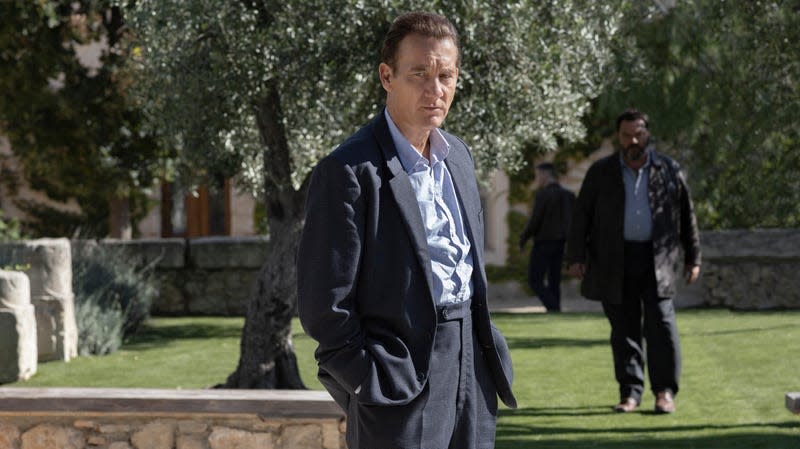Monsieur Spade is Clive Owen at his most Clive Owen

- Oops!Something went wrong.Please try again later.
I recently rewatched Croupier, director Mike Hodges’ grimy look at London casino culture that’s led by a babyfaced, 35-year-old Clive Owen as a writer moonlighting as a croupier, the French word for someone who runs gaming tables. Everything that made Owen a star is in this dark little morality tale: his intensity, intelligence, and haunted eyes make him a good-lucking pipe bomb that never goes off. But he comes close.
That quality drew the producers of James Bond to try to cast him as 007. But Owen had other plans for his career. Thankfully.
Then, I rewatched the season-one finale of his latest project, AMC’s Monsieur Spade, which aired on February 18. This six-part miniseries, inspired by Dashiell Hammet’s legendary private eye, Sam Spade, is a perfect spotlight for 59-year-old Owen, whose gaze has not lost any of its melancholic depth over the years. He’s still an actor of uncommon power whom Hollywood has consistently misunderstood.
Owen’s Spade is older and weakened by emphysema from too many years of cigarette smoking. He ran as far as he could from his ghosts, fell in love, found a reason to live, and lost that reason but found more as protector of a small French village and father figure to the feisty daughter of a former client.
The final moment of Monsieur Spade’s finale is both mournful and romantic, as our hero wears his trademark fedora for the first time and remembers the woman he still loves. That’s not an easy emotional note to hit, but Owen does it without saying a word, just a hopeful, mildly defiant look. The installment that precedes this moment of grace answers questions and solves mysteries in predictable and unpredictable ways.

But watching Owen glower as a hardboiled expat solving a gruesome murder of nuns and outwitting international secret agents reminded me of his ability to play wounded souls. I remember the first time I saw him in a movie, 2002’s The Borne Ultimatum.In director Doug Liman’s gritty action thriller, Matt Damon’s Jason Bourne is a government-trained killing machine with amnesia, a human terminator with a heart. But it is Clive Owen who gives the movie a real soul as a rival assassin who shows up 85 minutes in and is only onscreen for three. He barely has any dialogue, too. Bourne guns down his bespectacled character, and, as he’s dying in a field, he becomes a mirror for our anti-hero. To his shock, Bourne sees himself in Owen’s broken predator, who looks at Bourne and says: “Look at this. Look at what they make you give.” The unspoken answer is everything. Owen conveys a lifetime of loneliness and grief in just a few words.
I had, randomly, put on Children Of Men before plowing through Monsieur Spade for my review, and I recommend doing the same at least annually like it’s a holiday—maybe every November 16, which in the movie is the date celebrity “Baby” Diego, the last person born before humanity stopped procreating, is killed in a bar fight in 2027’s Buenos Aires. Children Of Men is peak Clive Owen. The actor—and I doubt many would argue with this—is at his most disheveled, world-weary best in Alfonso Curaon’s dystopian masterpiece. That said, Monsieur Spade is a close second. Very close.
In a way, Monsieur Spade is Clive Owen at his most Clive Owen. He cuts a tragic figure in director Cuarón’s meditation on life without a future, but in Scott Frank and Tom Fontana’s detective show, Owen growls, smirks, and longs, his lost American in France becoming a well-built underdog who is easy to root for. I love a tragedy, but I want Sam Spade to die an old, almost happy man.
Over the course of its moody first season, Monsieur Spade was occasionally murky, plot-wise. It wasn’t always clear who was who, which is a standard mystery trope, but there were characters whose motivations were difficult to understand. In a lesser show, this is a vibe killer, but a lesser show wouldn’t have cast Owen, whose Spade is a detective’s flashlight shining through the foggiest of storylines. He shows up, ask questions, gets punched, but every scene is improved by his character. Sharpened. One of Owen’s gifts as an actor is his ability to deliver clever quips and twisty, witty exposition credibly. He’s a smart guy, or skilled at portraying one, and Monsieur Spade makes ample use of that skill.
The finale features dueling snipers, a mad monk, and a deus ex machina, with the great Alfre Woodard showing up as a spymaster who gets to resolve one of the central plot points about an Algerian boy who may be a genius and a religious figure. It’s silly low-carb le Carré stuff made believable by Woodard, who is having a ball here (as is Owen in the scenes he shares with her).
But let’s backtrack to the aughts. There’s an alternate reality where Clive Owen accepted the role of James Bond when it was offered in 2007, no doubt combining Sean Connery’s street-tough persona with Pierce Brosnan’s elegance and rescuing the franchise, albeit in a slightly different way than sensitive hunk Daniel Craig ended up doing. In that reality, Hollywood embraces Owen and rewards him with multiple high-profile, big-budget Oscar-bait pictures for doing his movie-star duty. But in that dimension, Owen doesn’t pave a quirkier career for himself, a mix of action and drama, which means Monsieur Spade wouldn’t be Monsieur Spade. The show just doesn’t tick without him.
Anyway. I’m glad I live in this timeline.

